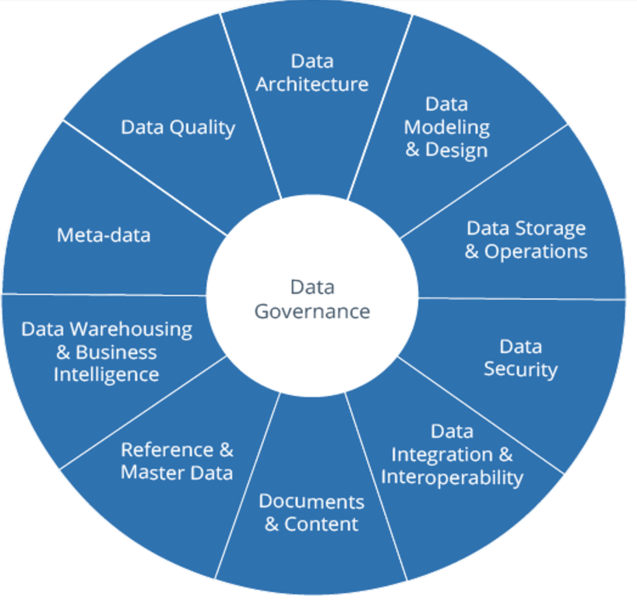
InfoSec Advisory with Del ADEN
It is often said that data are the new oil. The adage signifies not only how vital and valuable data are, but also the implications of data for an organization worldwide. The volume and variety of data has increased exponentially in recent years, revolutionising decision-making.
Intuition is no longer acceptable for executives when making big decisions; Consequently, every business needs to be deliberate about its data and have a clear strategy in place to ensure it is managed well and leveraged for the benefit of the organisation and its customers. A good data strategy will be driven from the perspective of enabling and accelerating the overall business strategy. It will also be aligned to the technology investments the business is making and span the breadth of regulatory requirements, business growth and operational efficiency.

Elements of a data strategy
So, what should your data strategy consist of?
1. Data Governance
Data governance is a core component of an overall data management strategy. Data governance is the process of managing the availability, usability, integrity and security of the data in enterprise systems, based on internal data standards and policies that also control data usage.
Effective data governance ensures that data is consistent and trustworthy and doesn’t get misused. It’s increasingly critical as organizations face new data privacy regulations and rely more and more on data analytics to help optimize operations and drive business decision-making.
A well-designed data governance program typically includes a governance team, a steering committee that acts as the governing body, and a group of data stewards. They work together to create the standards and policies for governing data, as well as implementation and enforcement procedures that are primarily carried out by the data stewards.
A key benefit of data governance is to ensure that data is used properly, both to avoid introducing data errors into systems and to block potential misuse of personal data about customers and other sensitive information.
2. Centralized Data Management
One of the most important requirements that a data strategy should focus on is maintenance of centralized master data, which should serve as one source of truth across the organization. Centralization not only brings accuracy, but efficiency, which, in turn, helps generate consistent and reliable management information systems (MIS) for reporting purposes.
Some of the primary benefits of centralized data include, but are not limited to:
- Avoid duplication of records across the organization
- Drive control and compliance in the creation and updating of records
- Lead to standardization of processes and uniformity in reports
- Facilitate audit and control
- Data quality
In a global marketplace where systems, people and processes are interconnected, quality data is an organisation’s most valued asset. The way in which an organisation addresses Data Quality can have an impact on an organisation’s financial position, legal and regulatory compliance, service delivery standards and customer satisfaction. It is therefore crucial that your organisation design, implement and sustain your Data Quality across the organisation to ensure its most valued asset is fit for purpose.
- Data Sharing and Flexibility
While the centralization of data focuses on the creation and maintenance of data in a central location, various functions within an organization need to use that centralized information, for example the supply chain, logistics, finance and tax functions require relevant information relating to vendors. Hence, the data structure should facilitate access by multiple functions, while the repository of data should be accessed on a need-to-know basis. This optimizes data availability, minimizes duplication and facilitates using the same set of information across the organization.
- Data in Real Time
A key requirement of today’s data strategy is real-time availability of business and marketing intelligence to drive informed decision-making. Business intelligence (BI) and market intelligence (MI) are key elements of data strategy, and they need to be aligned with organizational goals. Embedding these two elements as part of a data strategy can help organizations make informed decisions to guide the strategic vision of an organization.
- Data Security
Because data are critically important to every enterprise and great attention is paid to how they are managed, the security of data cannot be overlooked. While enterprises need data to make informed decisions, protection and the availability of such data to those who should have access to them is one of the biggest concerns. Imagine if data related to pricing in client contracts, which are confidential and sensitive, were accessible to people outside of sales or if patient health information stored digitally by a healthcare system or an insurance company were available in the public domain.
- Automation
Automation brings integrity to the quality of data captured at the source. Manual intervention can make data vulnerable to human errors, thereby compromising the overall quality of data. A strategy that focuses on channelling data through automation is not only reliable, but also meets audit prerequisites on control parameters. Moreover, automation helps to leverage preventive controls rather than relying on detective controls. As such it must be considered as part of you data strategy
- Big Data
The massive volumes of information generated and used for decision-making in business today fuel the booming business of data analytics and Big Data. Big Data describes huge volumes of data that flood a business on a daily basis, coming from an ever-growing variety of sources. It typically describes data sets with sizes beyond the ability of traditional data processing software tools to capture, process and curate in a timely fashion. The vast amounts and various types of information collected enable Big Data companies to approach the market in different ways and specialize in specific areas.
- Artificial Intelligence
Integrating artificial intelligence (AI) into the data stream to interpret and make predictive analysis can go a long way in enhancing your data strategies. One of the biggest advantages that AI systems provide is that they are easily scalable and will be beneficial to how you exploit Big Data.
- Data Analytics
Data analytics is the method of extracting and analyzing all manner of data in order to draw conclusions about the information. In addition, it uncovers hidden patterns or unknown correlations within the data or discovers emerging market trends and customer preferences. It is important that Data analytics is a key part of your organisation data strategy.
- Regulatory Requirements
An organization that is the custodian of the data that it owns also continues to have the responsibility to maintain privacy and avoid and misuse of such data. This is part of their key data strategy.
In Conclusion
In conclusion, we see data as being the lifeblood of the business and key to success. As such we support our clients in setting out their data strategy in a number of ways, from co-creating the strategy to periodic reviews of progress in implementation. We believe in applying our practical experience of delivering transformational programmes for data and analytics, in developing the data strategy and holistically working with the C-suite in setting out the what, the how and the when of strategic change. In this regard, Delta3 International stands ready to support you and your team
About the Author
Del Aden is a UK based Enterprise Solution Architect and InfoSec Evangelist. Currently, Del Aden focuses on helping customers prevent security breaches, implement Digital Transformation and advice on Business Continuity Strategies and Exercises. In addition, Del also provides security education to businesses and consumers by distilling complex security topics into actionable advice. Contact: [email protected] | WhatsApp:+44 7973 623 624 | Web: www.delta3.co









